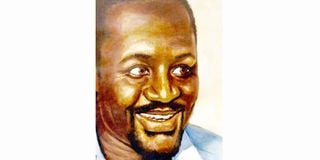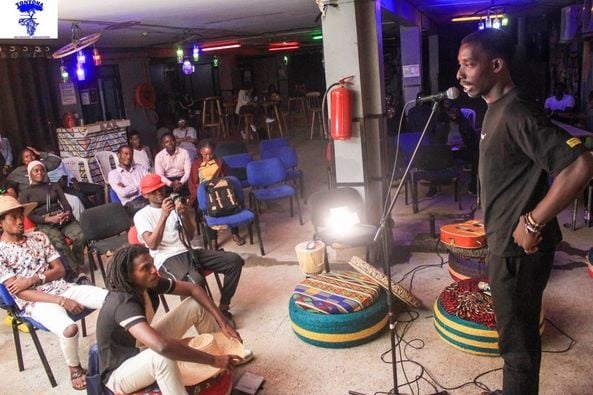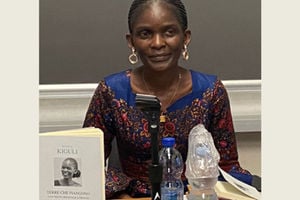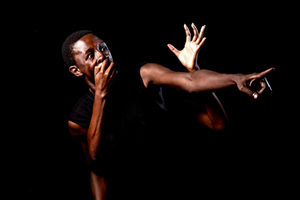
Okot p’Bitek
John Fitzgerald Kennedy, often referred to as JFK, served as the 35th president of the United States from 1961, until his assassination in 1963. During his 1,000 days in office, JFK revealed the wit and wisdom of the ages.
His politics viewed poetry and poets through a reddish lens, “When power leads man towards arrogance, poetry reminds him of his limitations. When power narrows the areas of man’s concern, poetry reminds him of the richness and diversity of his existence. When power corrupts, poetry cleanses, for art establishes the basic human truths, which must serve as the touchstones of our judgement.”
“The artists, however faithful to his personal vision of reality, becomes the last champion of the individual mind and sensibility against an intrusive society and an officious state. The great artist is thus a solitary figure. He has, as Frost said, “a lover’s quarrel with the world.” In pursuing his perceptions of reality, he must often sail against the currents of his time. This is not a popular role,” he adds.
Uganda’s greatest poet
Okot p’Bitek, arguably Uganda’s foremost poet, was such an artist. He was great. He was solitary. And he was rather trigger-happy with his mouth. So, when he would shoot off at the lip, he was keeping in character. All the while, being the poet whose love for the world ran hot and cold.
In the book Contesting Catholics: Benedicto Kiwanuka and the Birth of Postcolonial Uganda by Jonathan L. Earle and J.J. Carney, we see a Okot P’ Bitek impassioned by his times and immortalised by passion.
Origins
Okot p’Bitek was born in Gulu into a prominent Protestant family. He went to Gulu High School and King’s College, Budo. After completing teacher training in Mbarara, he conducted the Anglican choir at Sir Samuel Baker’s School. In the late 1950s and early 1960s, he completed courses at the universities of Bristol, Wales (Aberystwyth) and Oxford.
Later, he joined Makerere College in Kampala and started working at the Uganda Cultural Centre. It was here that he found his feet as a cultural writer and poet.
Politics
Okot P’ Bitek toyed with the idea of running for Parliament as a Uganda People’s Congress (UPC) candidate, but had second thoughts. He then returned to Oxford to work on Acholi and Langi histories.
His 1953 novel Lak Tar Miyo Kinyero Wilobo or White Teeth make us Laugh on Earth examined the moral and economic plight of Acholi labourers in Busoga and Buganda.
In this novel, a work of historical fiction, his skills as a dockside commentator are heavily in evidence.
“When I was home in Acholi, I had heard people say that there were very many jobs in Kampala, with very good pay. When I came to Kampala, I found that there were many jobs, but there were very many unemployed workers too. I searched and searched in vain for a job for a long time. Finally, I had only Shs5 left in my pocket. […] The good jobs with big pay in Kampala were for those who were well educated,” said Okeca Ladwong, or Atuk, a character in the novel.
Before Independence, most of the best schools and institutions of higher learning were in the South. So the north was largely left behind in terms of education compared with other regions.
In 1962, Uganda became Independent under a UPC lead government and took over the running and funding of mission schools, integrating them into one single system in order to adress this imbalance.
Since education or the lack thereof is a means to economic and social mobility, upward and downward, this placed the Acholi at a distinct disadvantage
Fighting the power
Bitek refused to accept this state of affairs as promoted by the colonial office. He crossed scimitars with Ganda patriots as he assailed Ganda secessionists.
“The decline of Mengo’s prestige and power should now become rapid, and the reactionaries face imminent and final collapse in the face of the nationalistic movement that has now engulfed the entire continent,” he argued.
“The political parties in Uganda must now work restlessly, concentrating their forces in the stronghold of feudalist Buganda Lukiiko and government, which is clearly bankrupt in their policy, to win away the people of Buganda. For the building of a democratic Uganda, and for the welfare of the whole population all progressive forces in Uganda must unite.”
Clearly, Okot P’ Bitek was a republican. And like all Ugandan republicans, he did not mind getting a ringside seat to the collapse of monarchism in Uganda.
“You loyal Muganda
Dressed in white kanzu
I see you kneeling
Before another man,
Trailing your kanzu
In the mud,
Like a priest
But serving an altar of man
Not God;
You man from Bunyoro
And you from Toro
What’s wrong with your knees
That you lie on your bellies
Eating dust?
Are you earthworms?”
What is Uhuru to you?
You Bairu from Ankole,” he wrote in Song of Lawino Song of Ocol.
To Okot P’ Bitek, republicanising Uganda was critical. He deplored the antiquatedness of monarchies. He wondered, rather loudly, about the wisdom of having governments being established by a head of state through a hereditary title.
Mocking regal traditions, he was also an anticlericalist. So when he took aim at the Democratic Party (DP), it was to jolt political agnostics towards normative arguments in favour of radicalism.
In Song of Lawino, Chapter 11 titled Buffalos of Poverty Knock the People Down’,’ he lights into the Democratic Party in scorching terms.
“The Democratic Party
Is the Party for Padres
The Party for fools and blockheads.
He says Catholics have numb heads
They hear everything from the Italian Fathers!
He says the Democratic Party
Will sell the land
To poor white men,” he wrote, tearing up the DP so thoroughly that one could claim that the proverbial she who wrote murder was a he!
Okot P’ Bitek was surely an activist-poet, reminding power of its limitations with rhetorical gusto.




